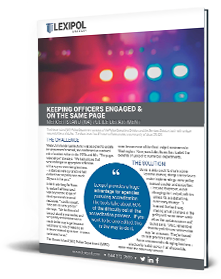The Challenge
When Commander Leslie Burns was assigned to update her department’s manual, she confronted an outdated mix of content written in the 1970s and 80s. “The pages were yellow!” she says. “We had policies that were no longer an appropriate reflection of the way we were doing business – instances where our practice had evolved but our policy was stuck 20 years in the past.”
It didn’t take long for Burns to realize the project was beyond the scope of the department’s internal resources. “I said to myself, ‘Who am I to write policy?’” she says. “We had heard of Lexipol about a year earlier, and we quickly decided that was a much better way to go because we’d have no way of keeping an in-house manual up to date. It was a no-brainer for us.”
The Mercer Island (WA) Police Department (MIPD) soon became one of the first Lexipol customers in Washington. Nine years later, Burns has touted the benefits of Lexipol to numerous departments.
The Solution
Burns is quick to share some lessons learned, things she believes make implementing a new policy manual quicker and smoother. First and foremost: Avoid changing the Lexipol policies unless it’s a substantive, necessary change. “I learned the hard way; making small changes in the policy will cause more work when the updates come out,” Burns says. “Also, remember that the policies are written that way for a reason. They’re based on best practices and case law.” Burns recommends changing business practice to match policy if at all possible, rather than the other way around.
Burns moved through the manual chapter by chapter, starting at the beginning, which took about two months. “Since then, I’d probably suggest a different approach,” she says. “Start with the high-liability policies, such as Use of Force, and knock those off first. Those are the ones you’re going to really need for patrol. We want everyone to be on the same page on pursuit, use of force, etc., from day one.”
Although it’s best not to have too many people involved in the policy review process, Burns warns, “Don’t do this in a vacuum.” Prepare officers for what’s coming and involve the union. “Encourage your union rep to call other Lexipol clients,” she says. “Then they can see that it’s not a big, scary thing.”
The Results
Burns says implementing Lexipol has helped the department in many ways. “It has made our accreditation process a whole lot easier,” she says. “Part of being accredited is that your policies and practices have to be in alignment. Lexipol provides a roadmap for accreditation.” Other benefits: the electronic updates and Daily Training Bulletins keep officers engaged with the manual, and MIPD members have confidence that they are following best practices and that their policies are in alignment with case law and state and federal law.
“We have a comprehensive manual backing us up. If we follow the manual and something goes south, our liability is going to be so much less,” Burns says. “That gives you a feeling of security. It helps you sleep better at night.”

